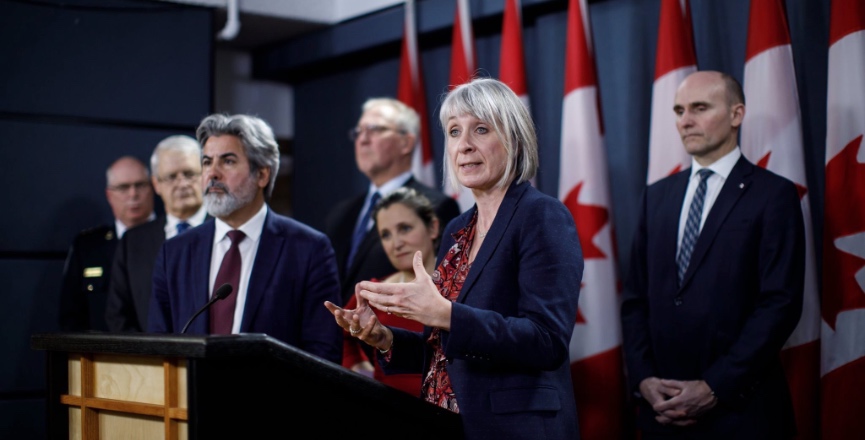It took a pandemic to get Ontario Conservative Premier Doug Ford and the progressive think tank the Canadian Centre for Policy Alternatives (CCPA) to agree on something, but that’s what happened this week.
Both the right-of-centre government and left-of-centre think tank want the federal government to significantly increase access to employment insurance (EI) in response to the COVID-19 crisis.
Premier Ford made that request, without details, while he was announcing a state of emergency in Ontario, on Tuesday morning.
The CCPA has gone into much greater detail. It just issued a report that includes a series of specific proposals for EI and workers’ leave — most of which are closely in line with what the federal NDP has been saying since the onset of the crisis.
The CCPA’s senior economist David Macdonald explains that the notion that most Canadians can work remotely and via the internet is a “myth.”
“The professions with the largest share of workers in Canada are truck driving, trades, cleaning, cashiering, food prep and care work,” Macdonald says. “They won’t be able to work from home, and in many cases will be on the front lines of this situation.”
In addition, as it stands now, most Canadian workers do not have paid sick leave, and those who benefit from such leave are disproportionately in the upper income category.
In 2019, Canadian employers paid less than one sixth (14 per cent) of sick leave for workers in the lowest income category, while they paid almost three quarters (74 per cent) of such leave for those in the highest income group.
Similarly, EI benefits are highly inadequate for the actual needs of the majority of Canadian workers. In 2018, only a third (33 per cent) of unemployed Canadian women and fewer than four out of 10 (38 per cent) unemployed men received EI benefits.
And for self-employed and part-time workers, the figures are much lower: a paltry 17 and 20 per cent respectively. The vast majority of workers in the latter two categories get zero unemployment benefits.
“With inadequate employer paid leave and too few unemployed workers receiving EI, we’ve set up a system in Canada where front-line workers will regularly have to decide between staying home when sick and being able to pay for rent or feeding their families,” Macdonald argues. “Not only is that an unfair choice; it’s dangerous.”
Reduce qualifying hours, expand access to EI
The CCPA lists concrete actions the government could take immediately to improve access to EI and sick leave, especially for lower-income and precarious workers.
To start with, the think tank proposes the government waive the requirement that workers provide a medical certificate (or doctor’s note) to qualify for the EI sickness benefit. It waived that requirement during the SARS outbreak, and accepted a signed declaration from the worker as sufficient evidence of illness. The CCPA wants the authorities to do the same now.
“It is dangerous,” the CCPA’s report points out, “to have possibly infected workers seeking out already crowded doctors’ offices.”
As well, the Ottawa-based think tank wants the government to create an emergency EI benefit for the many who do not now qualify. There is a precedent for such a measure, again during the SARS outbreak. At that time, the government made EI available, in a limited form for health-care workers who did not otherwise qualify.
The CCPA suggests the government should now mandate Service Canada, using the EI infrastructure, to administer a new expanded EI benefit. It should pay for this new benefit not out of the EI fund, but out of general revenues.
“When two out of three unemployed workers can’t get EI benefits today, we risk financial decisions overriding public health,” the report argues. “We can’t have gig workers or part-time workers not taking time off when they’re sick because they know EI won’t be there for them.”
Crucially, the CCPA advocates that the government should immediately lower qualifying hours for EI benefits from 600 to 360 hours worked. At the same time, the report wants the federal government to institute a “broad definition” of quarantine for the EI sickness benefit.
“Workers may self-quarantine (after a trip, for example), at their employer’s request, after testing positive for COVID-19, or from close contact with someone who has the virus,” the report points out. “All these reasons should be considered.”
The report proposes the government set up a hotline, available in multiple languages, so that all Canadians can get reliable information on financial support for COVID-19 via EI as easily as possible.
And, finally, the report suggests federal authorities should make sure COVID-19-related benefits don’t affect other EI benefits — payment related to quarantine must not count against non-related, future EI claims.
Prime Minister Trudeau said on Tuesday that the government is considering recalling Parliament, which has taken a break because of COVID-19, in order to pass certain measures that require legislation.
Among those, are possible changes to the EI system. The new CCPA report on EI and sick leave provides benchmarks by which we will be able to measure whatever steps the government might propose in the coming days.
Karl Nerenberg has been a journalist and filmmaker for more than 25 years. He is rabble’s politics reporter.
Image: Patty Hajdu/Twitter



